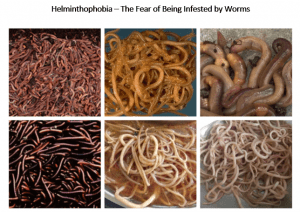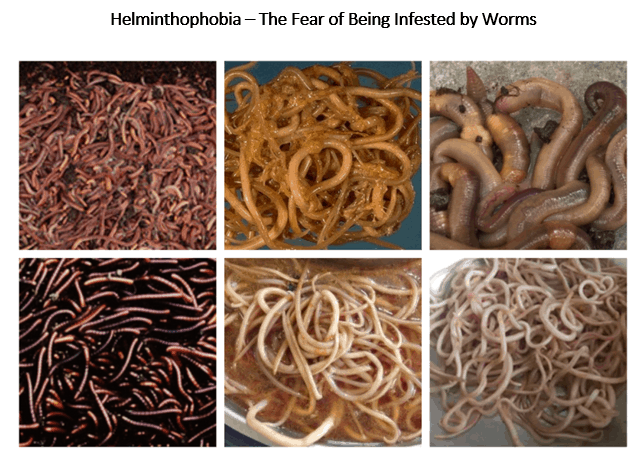Share This Article
Infested by Worms: Real Fear, Imaginary Problem
Imagine that you are playing football in the backyard of your home. You end up on the ground where you see some worms. The sight of their slimy bodies slithering and squirming sends a shiver through your body.
This may also happen: You’re taking out the garbage on a hot, summer day, when you open the garbage can and catch a glimpse of maggots at the bottom of the can. You drop the lid and let out a screech.
If you identify with these scenarios—and it causes a severe mental or physical reaction—you may be suffering from helminthophobia, or the fear of worms or being infested with worms (fear of maggots). The mere sight of worms or squirming maggots grips you with terror and you feel yourself choking up with dread. Subconsciously you may feel that the worms are crawling inside you or on your skin.
You’d like to explain your fears to the people around you, but you find you can’t do that for fear of being ridiculed or misunderstood, right? So, how do you deal with the morbid thoughts of these worms crawling inside you?

The key to overcoming any phobia is to understand what initiated the fear in you. You need to try to discover why you have a fear of worms. With this knowledge, you’ll have more control over your physical and psychological symptoms. You’ll also be better mentally prepared to overcome your deep fear of worms and maggots.
Let’s first take a quick look at some facts and features of helminthophobia.
What Is Helminthophobia?
Helminthophobia is the fear of being infested with worms phobia. It originates from the Greek word helmintho meaning “worm” and phobia meaning “fear.” The mere sight of a worm, or even something that closely resembles one, is enough to send a person with this phobia into a panic attack or experience extreme anxiety.
While such a fear is no doubt abnormal, it is real to a person suffering from it. Their fear exists no matter how hard anyone tries to explain how illogical or irrational it is.
So, what causes such a phobia?
Pinworm or ringworm are a part of growing up. Being infected with intestinal worms is fairly common in childhood, especially if you were brought up to play outside in your early years. Simply playing in the dirt or on the ground can lead to simple parasite infections in a child. Kids do not remember to keep their hands out of their mouths, especially younger ones. This writer remembers an incident where a young nephew picked up a piece of dog waste and, yes, put it in his mouth. The nephew was only a year old and these types of scenarios are quite common for that age group. The point being, catching parasites is not out of the ordinary.
The infected child may have been administered medicines to treat the infection, and you may have seen these creepies crawling in the feces. The memory remained in your subconscious, potentially leading to a lifelong fear of being infested with worms.
Or it may have been a movie like Squirm that did it to you. Many researchers say that the fear of worms is evolutionary as well, stemming from the fear of poisonous snakes, reptiles etc., as worms closely resemble them.
Psychologists also say that a fear of worms may stem from a deep-rooted memory of a traumatic sexual experience which the mind may have repressed. While less common, this can be a cause of fear of worms and maggots.
A person doesn’t need to be exposed to worms to experience helminthophobia. At times, it is their subconscious that creates such a situation. The brain initiates momentary impulses and reactions even in a situation where the subject of the phobia is not present. This generates surprise, anxiety or stress that relates very similarly to their fear of being infested with worms.
Symptoms of Helminthophobia
Helminthophobia affects both the mind and body of an individual. Mostly, an individual who suffers from helminthophobia experiences sudden panic attacks. These attacks happen so quickly that the individual feels helpless and distressed. Thus, anyone who has helminthophobia should learn how to cope with these sudden situations. Such panic attacks also give rise to a number of physical symptoms.
Given below are some of the physical symptoms of helminthophobia:
- Chest pain or feelings of suffocation in the chest
- Sweating
- Elevated blood pressure and heart rate
- Trembling
- Nausea
- Breathing difficulty
- Dry mouth
- Headache
- A sensation to go to the toilet
- Fainting or loss of consciousness
- Inability to move
But the list does not end here. In severe cases, you may experience hyperventilation and other psychological symptoms as well.
The psychological symptoms of helminthophobia include:
- Fear and anxiety
- Feeling hopeless
- Fear of fainting
- Inability to concentrate
- Irritation, anger, and mood swings
- Feeling uncomfortable with other people
- Feeling ashamed or guilty
- Fear of losing control of oneself
- Scary memories and thoughts
- Fear of death or injury
- Feeling disconnected from everything
Treatment for Helminthophobia
Almost every individual suffering from any kind of phobia tends to avoid situations that trigger their phobia. This may seem to be a good control measure at that particular time. But it may not be enough in all situations. For instance, how do you escape from your thoughts?
Most phobias have proven to be curable. The pace and extent of recovery depend on the mental state of the patient and the severity of helminthophobia that the person experiences. There are also cases when a combination of treatment measures may facilitate recovery.
Self-Help for Helminthophobia
While self-help is the first step towards tackling helminthophobia or phobias of any kind, you should remember not to rely solely on self-treatment if your condition isn’t improving.
This doesn’t mean you are helpless, however. As discussed before, the first thing you must understand is what led to or initiated your fear. You need to acknowledge that it is irrational and unreal. Most importantly, you should remind yourself that you are not to blame.
Reach out to family and friends for help and support. Sure, they may at first treat you with disbelief and perhaps even ridicule, but when they understand the gravity of the situation, they will be sure to step in and do the right thing to help you deal with the fear.
Seeking professional help can also set you on the path of recovery. Once diagnosed, you may be able to overcome this fear by nipping it in the bud.
Professional Help for Helminthophobia
Seeking professional help is the best way to overcome any kind of phobia. You should always consult a psychologist or any other mental health specialist as part of your recovery process.
As in the case of every other phobia, the fear of being infested with worms does not have a particular cure. But many general phobia treatment methods can be applied here too.
Talk Therapy
Talk therapies can be highly effective in treating helminthophobia. These are very calm and peaceful treatments in which the person suffering from helminthophobia talks to an expert and trained professional about their feelings, thoughts, and fears. Such therapies help you understand and evaluate yourself, solve your complicated thoughts, and spend some quality time with a person who listens to you and understands your situation.
Just like the other forms of treatment, talk therapies also provide mental and emotional support to the individual to facilitate their recovery process.
Cognitive behavioral therapy is based on the concept that our behavior is deeply influenced by our individual perceptions and thoughts. When an individual experiences anxiety or stress, his perception of reality gets distorted. Cognitive behavioral therapy analyzes such perceptual distortions and takes up strategies to resolve these misperceptions. In other words, CBT helps you to differentiate reality from your fears.
Medication has not been a recommended treatment method for helminthophobia. Counseling sessions, therapies, and other mental stimulation programs are more suited to addressing the phobia. However, a doctor may prescribe a short-term course of medication to help you cope with anxiety and depression.
General Tips to Overcome Helminthophobia
The most basic tool to overcome helminthophobia is to believe in yourself. With or without any other assisted therapy, you can avoid the occurrence of phobias by taking up some important strategies in your daily life.
- Identify your fear and realize that it exists only in you.
- Set small and practical goals that give you confidence when you achieve them.
- Imagine and set up a destructive mechanism against the situations that develop your phobia. Change these strategies regularly when you achieve your goals.
- Realize that being afraid is perfectly normal. Every human being fears something and has experienced anxiousness because of it.
- Encounter your fears with a calm and cool mindset. Remind yourself that you will overcome your helminthophobia. This will provide you with greater motivation to continue the recovery process.
Bottom Line
Helminthophobia is no different from other phobias. By adopting a strong mindset along with professional guidance, you can overcome your fear of being infested with worms. And what better way to celebrate than to score some amazing goals in your backyard yet again!
Similar Posts, Fear of Chemicals





